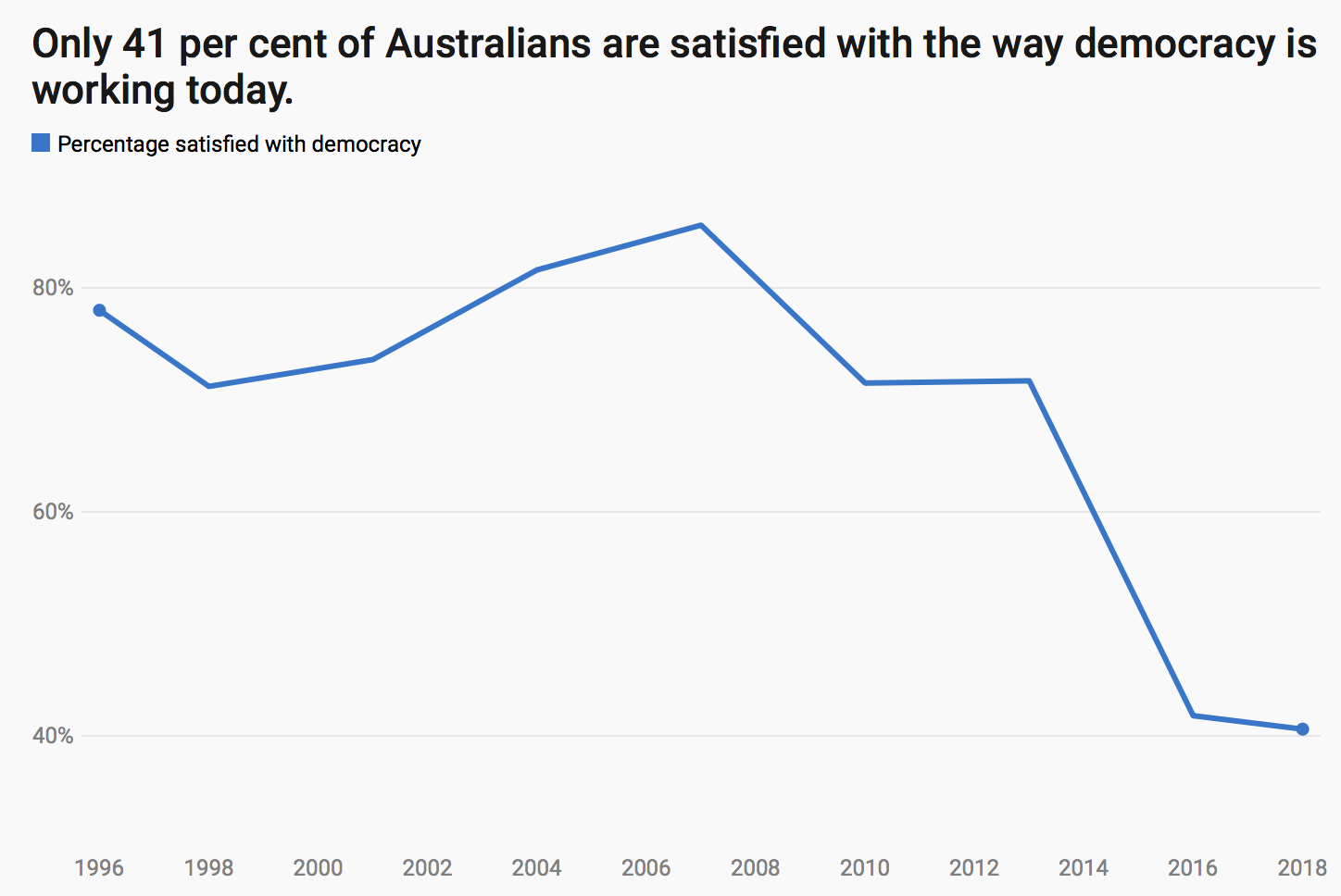PATRICK WOOD. Federal election 2019: Could these 15 ideas restore faith in politics? (ABC News)
May 9, 2019Should Australia have fixed parliamentary terms? Or real-time disclosure of political donations? How about a “citizen jury” that can decide on issues of national importance?
These are just three of 15 ideas outlined in a new report aimed at improving our democracy, which has been pitched to our federal politicians this election.
“Australia’s democracy … is frayed and public confidence in our system of governance is in worrying decline,” the Reforming Our Democracy report states.
The report is a collaboration between the University of Melbourne, the newDemocracy Foundation, and the Susan McKinnon Foundation, and taps into a growing dissatisfaction with the political system.

Its authors lament that Australia was once a world leader in democratic innovation — from the pursuit of an eight-hour work day in the 1850s to the suffragette movement in the 1890s — but now says we’ve lost our way.
Here are the 15 ideas they wants the winner of the May 18 election to pursue:
- Review of parliamentary terms to provide more certainty and improve government decision-making.
- Appoint a genuinely independent Speaker of the House and President of the Senate.
- Trial changes to seating arrangements in parliament to encourage more civility and constructive dialogue.
- Introduce more “free votes” in the parliament through a new parliamentary convention.
- Real reform on political donations and campaign financing.
- More stringent transparency requirements for political parties.
- Trial of AEC-issued candidate information packs that give voters more information about local candidates.
- Undertake a process after each election that gives citizens a chance to communicate how we can improve elections.
- Commit political parties to the same standards that companies are bound by when they advertise during election campaigns to promote better truth in advertising.
- Comprehensive and continual training in policy, ethics and procedures for MPs and ministerial staff.
- Commit to stronger regulation of lobbyists.
- Independent selection process for senior appointments to the Australian Public Service, the judiciary and major statutory bodies.
- Trial a citizen jury that would allow a small representative sample of the community to explore a major national issue in depth.
- Lead a national conversation to renew Australian democracy and update the Constitution.
- Lead a national conversation about the operation of the Australian Federation.
The list has been endorsed by the likes of former Victorian Labor premier John Brumby and former Queensland LNP premier Campbell Newman.
Report co-author and newDemocracy director Iain Walker said it wasn’t good enough to say the system was broken if we didn’t then try to fix it.
“This is just that little propulsion to say that whoever is in government come May 19, it’s OK to trial something.
“It’s OK for it not to work, but if it does work, think of the dividend that you’re going to get.”
How realistic are these ideas?
Some of the ideas have been well-canvassed, or even implemented, in the past.
The states have embraced fixed parliamentary terms, for example, but the proposition hasn’t been a priority a federal level and would require a constitutional change.
There has also been a call for real-time disclosure of political donations, but Labor and the Coalition united in January to vote down legislation that would have made it happen.
Among the more novel ideas canvassed is to randomly change seating arrangements for events like Question Time, meaning Liberal and Labor MPs could find themselves next to each other during debate.
“If you think about the set-up of our Parliament, they’re set up for conflict,” Melbourne University principal fellow Nicholas Reece said.
“Mix them up randomly from one session to another … and in that way, you’ll encourage a much more convivial atmosphere.”
Then there is the “citizen jury” concept, in which a group of punters spend months exploring an issue — say, tax reform or fair levels of welfare — and developing a report that explains where common ground can be found.
The report would then be tabled to parliament for all parties to respond to.
“Politicians are regularly accused of being too focused on their immediate political ends and this mechanism helps government to earn trust by injecting an informed common-ground position,” the paper contends.
The idea has shades of the “2020 summit” — a series of working groups convened by then Prime Minister Kevin Rudd in 2008 where hundreds of citizen delegates gathered to thrash out 10 issues.
It became a lightning rod for criticism about representation.
Both Mr Reece and Mr Walker said these weren’t radical or overly ambitious ideas, and indeed could even garner bipartisan support.
“That’s the spirit of the paper, to say, ‘Let’s try things’,” Mr Walker said.
“Wouldn’t it be great to hear those competing for government now to tell us what they’re willing to do to see democracy done better.”
This article was published by ABC News on the 7th of May 2019.
Patrick Wood is a digital journalist with the ABC.



